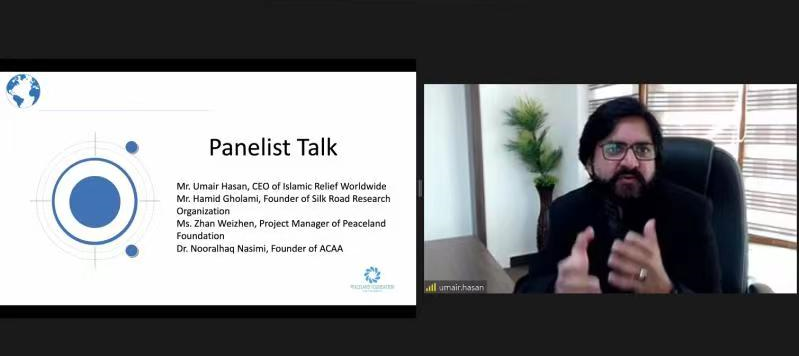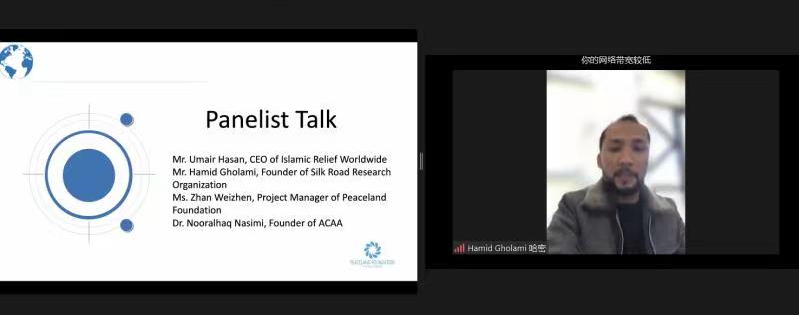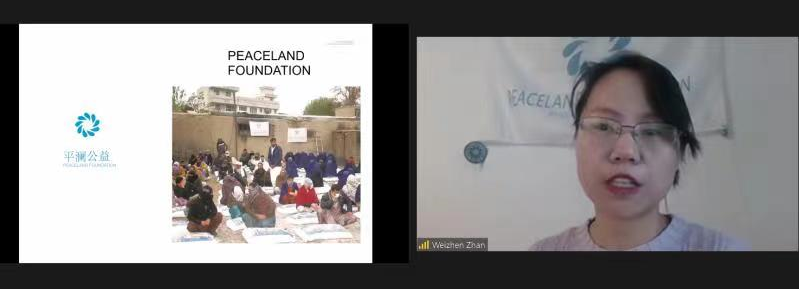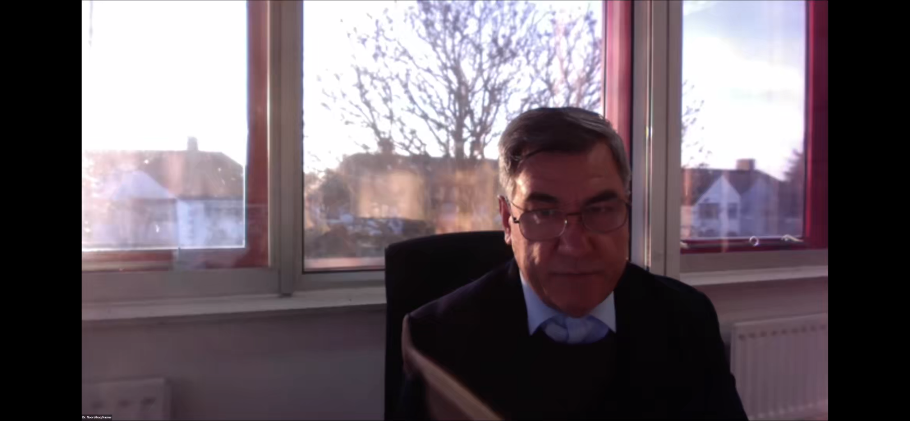209, Expert International Mansion,
Hootun South Road, Haidian District,
Beijing, China
Tel: 010-62928367 | Email: peaceland@peaceland.org.cn
Roundtable Background
This winter is particularly harsh in Afghanistan because the wintertime has significantly worsened the humanitarian situation in Afghanistan, with its already ongoing crisis. Last year, due to the drought and economic crisis, around 23 million Afghan People, which is half of the population, are food insecure, with 8.7 million people at risk of starvation to death and more than 70,000 internally displaced people lack proper heating. This year, according to the UN Office for the Coordination of Humanitarian Affairs, food insecurity, shelter and heating insufficiency remain critical. Millions of families are simply not able to make it through another harsh winter.
Therefore, to better prepare the humanitarian actors to cope with this winter crisis in Afghanistan, this year Peaceland Foundation organized this discussion on December 14, 2022, learning from and sharing experiences and best practices with agencies who work on the front line in Afghanistan.

Moderator: Liu Xiran (Peaceland Foundation)
Guest and Organization Introduction
Mr. Umair Hasan is the country director of Islamic Relief in Afghanistan. Islamic Relief is a 40-year-old organization, started in 1984 in the UK, as a Muslim international organization in the West. It now works in 40 countries. Mr. Hasan is an experienced leader in the humanitarian and development sector with a particular interest in strategic leadership, leadership development, agility, and organizational effectiveness.
Mr. Hamid Gholami is one of the founders of the Afghan Silk Road Research Organization. In December 2021, Beijing One Heart Sphere Charity Foundation signed an agreement with Silk Road Research Organization to provide humanitarian assistance to impoverished families in Afghanistan, focusing on welfare, treatment, emergency assistance. Mr. Gholami is also the head of the Chinese Department of Kabul University, and the executive director of the Confucius Institute at Kabul University.
Ms. Zhan Weizhen, Project Manager of Peaceland Foundation based in Geneva. Peaceland Foundation was founded in 2018 with the aim of responding to international humanitarian crisis and natural disasters. Peaceland’s long-term projects include de-mining in Cambodia, climate change operation in Tanzania, refugee project in Syria, etc. Ms. Zhan used to manage refugee projects in Lebanon, implement child legal protection projects in China and carry out human rights research at the European Court of Human Rights.
Dr. Nooralhaq Nasimi came to the UK in 1999 as a refugee from Afghanistan. He founded ACAA in 2000 to help support refugees like himself in their integration and empowerment in British society. With ACAA having experienced increased demands for providing assistance with the crisis that unfolded in Afghanistan in August 2021, he has guided a dedicated team of staff members and volunteers in supporting recent arrivals to the UK and advocating for human rights in Afghanistan.
(Listed in the order of speech)
Panelist Talk
 |
Mr. Umair Hasan presented an overview of situation in Afghanistan and Islamic Relief’s work there.
Afghanistan is poorly prepared for winter, with a lack of availability to coal, lack of exposure to solar technology, and weak purchasing power, in rural areas in particular.
Islamic Relief has started their program in Afghanistan since 2001, responding to emergencies, taking care of orphans and widows, and working with women-headed households. They are now working in 13 provinces in Afghanistan with 7 offices and more than 500 staffs. Emergency response includes food security and livelihood projects; they also carried out health program, community-based education.
This year, Islamic Relief covers around 10,000 families, primarily in areas severely hit in winter. They provided cash (for its flexibility to ensure food and health services), and also directly provided food, or vouchers with suppliers and vendors for fuel and food. They also have a program of digital payments piloting currently in cooperation with UNCDF.
Mr. Hasan noticed the challenge that donors spend too much time formulating a plan when the winter has already passed. He admitted that Islamic Relief started this year’s support in December but it was still a bit late. There is also no real data on how much people actually survived the winter with international support. He emphasized the importance of coordination among different organizations so that every district in Afghanistan can be covered under the limited budget and scale.
At last, he commented that future programs need more investment in preparation, need to be time-sensitive, and need to have equal coverage.
 |
Mr. Hamid Gholami introduced the collaboration between Beijing One Heart Sphere Charity Foundation and Silk Road Research Organization in Afghanistan.
Beijing One Heart Sphere Charity Foundation have been providing Afghan families with food, coal, medical service and other support since December 2021, by collaborating with Afghan Silk Road Research Organization. They also cooperated with the Bamyan Cultural Department to maintain Bamyan ancient cultural heritages.
During the past year, they have developed nine stages of aid projects, providing about $400,000 aid, benefiting more than 4,000 families.
i) Through these nine phases, they addressed different groups, including low-wage school staffs, unemployed families, women-headed families, people heavily stricken by earthquake and floods, and other groups facing extreme hardships.
ii) Aid provided in these nine phases mainly includes food, clothes and fuel distribution, hygiene kits, medical care, etc.
iii) They mainly operated in Kabul, Bamyan, Ghazni, Paktika, and Logar province, identifying families in need through careful survey and home visit by volunteers.
Right now, they are engaging more households in and outside Kabul to be benefited from their aid. This winter, they are planning distribute coal aid for 1000 poor families in Kabul, Bamyan and Ghazni provinces; and continue to distribute food aid for impoverished family in the coming year. They will also sign contracts with schools to enable children from some poor families to continue their education; and agreements with hospitals to provide them with necessary medical equipment. Meanwhile, they have plan to build potato warehouses in Bamyan province for potato processing.
 |
Ms. Zhan Weizhen introduced Peaceland Foundation and their work in Afghanistan.
Peaceland has been working in Afghanistan since 2021 to provide cultural heritage protection, earthquake relief, local rescue team capacity building and material support.
To respond to crisis in winter, Peaceland’s main work is material assistance. Peaceland has already distributed tons of food to the vulnerable people in Afghanistan. Among these assistances, the most important two events are milk powder and clothes donation with the support of Chinese enterprises.
In Afghanistan, Peaceland collaborated with a local NGO—Village’s Charity Foundation to carry out aid distribution. Until now, they have distributed 7,000 winter clothes to Kabul, Wardak, Baghlan and Bamyan provinces.
Meanwhile, Ms. Zhan pointed out that Chinese companies tend to provide material rather than cash because of the difficulty in cash transfer. However, the transport procedures usually take 2-3 month before the families receive the donation.
Ms. Zhan also noted that two challenges exist for Peaceland operations. Firstly, it is difficult to assess the actual needs in Afghanistan in terms of who needs help and how many needs are needed. Secondly, the language barrier is another challenge for Chinese support to arrive in Afghanistan.
 |
Dr. Nooralhaq Nasimi introduced ACAA and gave a deeper insight into the situation in Afghanistan.
Dr. Nasimi founded ACAA to help those who are in the same situation as he did, being unable to access services or opportunities, or not knowing how to communicate because of languages. The organization has become the main contact point for thousands of Afghan people in the UK. ACAA has carried out humanitarian projects to Afghanistan for 10 years, focusing on legal advice and also donated medical equipment during the COVID to help people survive. Although ACAA has evacuated from Afghanistan since the fall of Afghanistan, they are approaching organizations and help Afghan people through partnerships, fundraising events.
Dr. Nasimi pointed to the fact that after 43 years of war and conflicts, Afghanistan has not recovered from abject poverty and hunger. Although many organizations have taken actions, miseries are still happening in this small country. He mentioned two root causes of this situation.
i) The basic economic infrastructure is not established that Afghan people must always beg for donors rather than make a life by themselves. Therefore, (economic) sustainability is a very important issue in Afghanistan.
ii) Another big problem that Afghanistan facing is corruption, with aid going to the wrong hand and not properly distributed. A mechanism is necessary for transparent aid distribution, making sure aid go to the right people.
Therefore, Dr. Nasimi is concerning about the future of Afghanistan, and he proposed to establish a more sustainable economic model in Afghanistan.
Panelist Discussion
Fundraising under the economic sanction
Mr. Hasan presented that they get funding from both within and outside Afghanistan under the economic sanction faced by Afghanistan. They have partnership with United Nations, for example, OCHA is managing Afghanistan Humanitarian Fund to provide funding for humanitarian response and winter support. Besides, they are channeling funding by themselves from countries like US, UK, Germany and Australia. There is also humanitarian facility provided by UNAMA, funds given to which in New York can be used in Afghanistan.
Mr. Hasan also noted that their organization does not deliver any foreign materials into Afghanistan but makes procurement within the country. There are challenges of donating materials which must fully coincide with local need and culture.
Capacity building
Dr. Nasimi emphasized the importance of building capacity for Afghan people in fundraising across the world. Although the diaspora may contribute millions of dollars to Afghanistan for reconstruction and humanitarian relief, billions of dollars are floating around in the US, the UK, Canada, and elsewhere, raised by people who claim to but don’t actually provide any substantial support to Afghanistan.
Mr. Hasan believed that although the time is rough, there is still potential value for building capacity in the younger generation in hope of making a long-term impact for the future.
Solar system for electricity
Ms. Zhan and Mr. Hasan discussed potential solution for the shortage of electricity, such as introducing solar panels to Afghanistan to provide sustainable electricity to make it through the winter. They also discussed the challenges facing many NGOs as Taliban Regime is restraining policies on them.
Q&A Session
On the question of protecting intangible cultural heritage in Afghanistan, Dr. Nasimi says that it depends on the city political situations. Afghan tribes have been destroying adversaries’ heritage for hundreds of years. The difficulty of cultural protection is especially pronounced considering that the ruling minority has limited affection for the Afghan land.
On the question of providing mental health support, Mr. Hasan pointed out that his organization has projects on supporting, in particular, the female population who are disproportionately affected by conflicts through mental counseling.
 |
Authors: Chen Kaiming, Li Yumeng
Editor: Zhan Weizhen

209, Expert International Mansion,
Hootun South Road, Haidian District,
Beijing, China
Tel: 010-62928367 | Email: peaceland@peaceland.org.cn
© Copyright 2022 Peaceland Foundation 京ICP备 18056266号